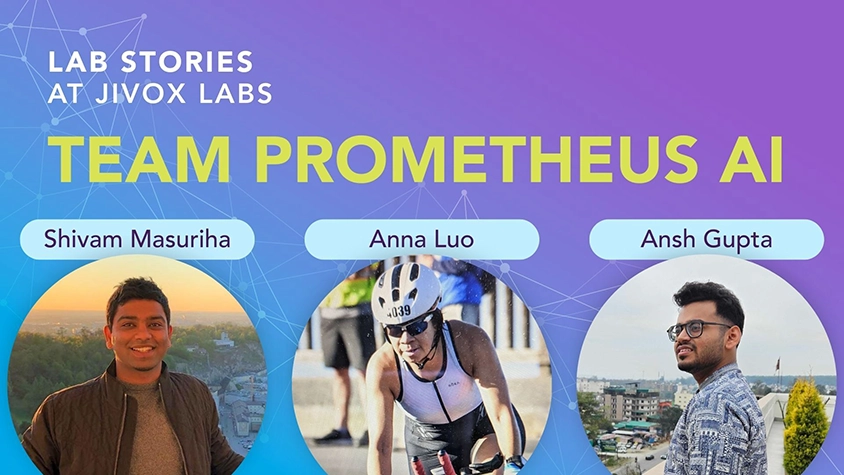So, how did a Greek God find himself in a hackathon, trying to solve for commerce media problems?
Well, it starts with two guys stealing minutes between meetings, huddled outside conference rooms like they’re planning some sort of corporate heist. Shivam and Ansh had been wrestling with this recommendation engine problem for months. You know that feeling when you’ve got this itch you just can’t scratch? Their old models were becoming ineffectual as the product evolved, and they were stuck watching all this potential just…sit there. Like humans before fire, they had all the raw materials but were missing that crucial spark to bring everything to life.
It’s fitting that their team eventually took the name Prometheus AI, inspired by the Greek Titan who looked at humans shivering in the dark and thought, “You know what? The gods are hoarding all the good stuff up on Mount Olympus. Someone’s gotta do something about this.” So he snuck up there, and with a little divine thievery, Prometheus stole the eternal flame from the gods and delivered the gift of fire to humanity.
His name literally means “forethought” – the ability to see what’s coming and plan accordingly – which explains why he knew exactly what humans needed to thrive, even if it meant defying Zeus. And defy Zeus he did: the King of the Gods wasn’t exactly thrilled about this act of rebellion and chained Prometheus to a rock for eternal punishment, but humans got civilization out of the deal, so you might say it was a decent trade-off.
And then, like divine intervention, the DaVinci AI Labs Hackathon problem statements dropped, and for Shivam and Ansh it was like someone had just handed them the perfect excuse. “It was more of a personal bias,” Shivam admits. “The long itch that we wanted to scratch and solve for it properly.”
When Two Different Worlds Collide
But here’s where it gets interesting. Through some hackathon matchmaking magic that none of them quite understand, Anna joined their team. She’s still curious about how they pair people, honestly.
While the guys were deep in the technical weeds – data models, optimization engines, all that fun stuff – Anna was thinking about something completely different. Real customers. With real budgets. Who have to trudge back to their CEOs every quarter and explain where the marketing money went. Just like Prometheus bridged the gap between the gods and mortals, Anna became the translator between technical possibility and business reality.
And that’s when she had this lightbulb moment. “I realized we’re not too different from how Jivox markets itself. We’re always looking for net new customers, not just selling to existing ones.” So this whole focus on incrementality hit close to home. When you’re spending money on ads, what you really care about is whether you’re gaining genuinely new buyers, not just getting the same people to buy again.
That’s when different viewpoints started crashing together in the best possible way.
Late Night Video Calls And The Ferrari Without Gas
Late-night video calls became their new normal. Everyone was scattered across time zones, trying to balance their actual day jobs with this crazy idea. Their normal work hours were packed with product releases and regular deadlines, so naturally, it all became these late-night huddles where they’d hash things out. Much like Prometheus sneaking up Mount Olympus under cover of darkness, they conducted their real work when the corporate world was asleep.
But here’s what’s interesting – the different time zones actually worked in their favor. As Anna put it, they could always start their day and see notes from whoever had been working the night before. It was like having a 24-hour innovation cycle running continuously. Their own version of an eternal flame, passed from one team member to the next across the globe.
Here’s where their ambition really showed: they decided to push beyond the hackathon constraints. Sure, they had limited data and two weeks, but they kept asking bigger questions. What if we could tap into more data sources?
They weren’t content with just solving the immediate problem. They wanted to tackle something that could genuinely help customers. “We used the hackathon as a platform to identify the problem. We went sort of over and beyond to look for other data sources as well.”
Anna puts their challenge perfectly: “AI is like a Ferrari. But if you don’t have gas or fuel, it won’t run.” Without quality data, even the most sophisticated AI is just potential that’s sitting in the garage. They had the horsepower – Shivam’s performance expertise, Ansh’s ability to somehow stitch together data from ten different sources – but they needed that real-world perspective to actually fuel their solution.
The Problem-Solving Machine
Ansh became the stuff of legend during those two weeks. Shivam would mention a problem in the morning, maybe something about data integration or model optimization. By evening, he’d casually follow up just to check in, only to discover Ansh had already built the entire solution.
“Hey, just following up. What can we do about this?” Shivam would ask. “Hey, I have the solution ready. This is how it’s working,” became Ansh’s signature response.
Who does that? Apparently Ansh does. The guy just doesn’t get tired, and he attacks problems with this relentless speed that leaves everyone else wondering what kind of energy drinks he’s on.
And…no questions or details escaped Ansh. Anna saw the “looking” emojis he posted on all the Slack discussion threads. This cracked her up — truly a highlight of her mornings!
The Incrementality Breakthrough
But the real breakthrough came when they realized they could measure something most people struggle with – incrementality. Not just “this ad got clicks” but “this ad actually brought us customers we wouldn’t have had otherwise.” They had essentially stolen fire from the marketing gods – the ability to see true causation, not just correlation. Like their mythological namesake, whose gift of foresight let him see what humanity needed before anyone else did, Team Prometheus AI could see the future value of customers that traditional metrics completely missed.
Think about it this way: most campaign data is pretty vanilla. Click-through rates, conversion rates, the usual suspects. But if you’re running across multiple channels, you need to capture something way more valuable – are you actually growing your customer base, or are you just getting better at reaching the same people?
“Once we got hold of data which could actually solve for these things, that became like an interesting point for us,” one of them explains. Now, it wasn’t this impossible problem anymore. There was definitely a way to make the data work and actually measure incremental revenue.
Because here’s the thing: humans can spot maybe a few patterns in campaign data. AI can spot hundreds. “Every moment it changes. AI keeps on taking decisions dynamically and making sure your campaign performs best.” It’s like having your own personal oracle that never sleeps, never gets distracted, but (thankfully) it doesn’t speak in riddles.
The Dream Team Dynamic
What struck me most about talking to these three? They genuinely love solving hard problems and each other’s weird superpowers. It kind of feels like you’re watching the perfect fusion of divine gifts – except instead of flight, lightning bolts, and supernatural strength, they got product vision, marketing insight, and coding wizardry.
Anna loves pushing limits because that’s often how real problems get solved. When she brought this incrementality idea to the team – something pretty far outside their usual product thinking – she wasn’t sure how they’d react. “What I really want to commend this team is, nobody says no,” she says. “Sometimes that’s how real problems get addressed.”
Shivam raves about Anna’s ability to come up with amazing, sometimes crazy ideas that make you stretch yourself. “She’ll push you to look at things which you were missing or thinking are not important, but once you explore it, something amazing would come out of it.” She’s basically the Athena of the group – breathing life into concepts that might otherwise remain lifeless clay.
And Ansh? Well, Ansh has apparently achieved superhuman status. “You keep throwing problems at him. He’ll find a way to solve it. He’s not getting tired for some reason,” Shivam marvels. The speed he works at is honestly kind of amazing – and slightly intimidating if you’re trying to keep up. Some suspect he made his own deal with the gods for unlimited energy (though the terms of that contract remain mysterious.)
Firing Up the Road Ahead
What they built goes beyond basic performance optimization. They created something that measures the kind of performance that actually drives business growth – not just clicks and conversions, but genuine customer acquisition that impacts the bottom line. They essentially gave marketers the power to see through the smoke and mirrors of vanity metrics to what really matters.
This is exactly what happens when you put different minds together – a product manager, a marketer who gets customer acquisition, and a developer who apparently never gets tired, all working together way past their bedtimes because they think they might be onto something.
While the original Prometheus suffered eternal punishment for his act of rebellion, Team Prometheus AI got rewarded for theirs. Zeus might have chained the mythical fire-stealer to a rock, but the corporate gods smiled upon these modern rebels and handed them a hackathon victory.
Prometheus stole fire from the gods and gave it to humans. Team Prometheus AI? They’re just stealing good ideas from data and giving them to anyone trying to figure out if their marketing actually works. Not a bad way to win a hackathon, if you ask me.
What’s next for Team Prometheus AI? It’s unclear whether they will attempt to steal fire like their namesake but with the right team to pull off the heist, who knows? They just might be crazy enough to do it.

